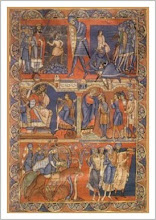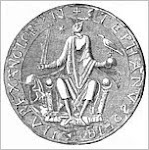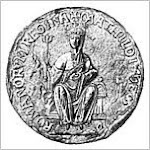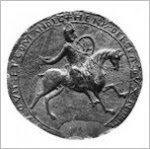• 1141: The Battle of Lincoln
Excerpt from Gesta Stephani:
Then when a very long time had passed and the earl obeyed the king no more loyally than usual and staying at the castle of Lincoln with his wife and sons issued harsh orders to the townsmen and the people of the neighbourhood, the townsmen privately and secretly sent messages to the king, urging him again and again, in very earnest terms, to come as quickly as possible with reinforcements to besiege the earl. The king, arriving suddenly and unexpectedly, was admitted by the townsmen and found the castle almost empty, except for the earl's wife and brother and a few of their adherents, whom the earl had left there when the king entered the town, just managing to escape by himself. So, as the king besieged the castle with resolution and spirit and most grievously afflicted the garrison with catapults and other engines of different sorts, the Earl of Chester sent to Robert Earl of Gloucester, Miles also, and all who had armed themselves against the king, and likewise brought with him a dreadful and unendurable mass of Welsh, all in agreement, in complete harmony, together to overthrow the king. It was the feast of the Purification When at early dawn they were celebrating the solemnity of the Mass and the king, according to the rite and office of the day, was carrying a lighted candle in his hand, the light suddenly went out and the candle too, they say, was broken for the moment but, kept in his hand, mended and relit, which of course was a sign that he would lose the dignity of the kingdom for his sin and at length, when penance had been rendered, by God's favour wondrously and gloriously get it back again. And that he still kept hold of the candle, though it had been broken in his hand, signifies that he did not utterly abandon the kingdom and did not even lose the name of king, though imprisoned, and it was wondrously brought about by God's providence that though he was kept among his bitterest enemies they still could not prevent his being king.
The king, on hearing that the enemy would arrive very shortly and fight that very day if he did not make his escape, refused to sully his fame by the disgrace of flight, and arraying his columns with care and in good order, as a soldier should, he boldly went to meet them outside the town. When he had sent forward a very strong body of knights and footmen to stop them as they emerged from a ford, they on the other side prudently drew up their line of battle, furiously charged the king's men, and seized the ford, and when they had scattered them with great vigour and put them to flight then with one mind and dauntless spirit they joined battle with the king's army and after killing some and taking others for ransom (but a great many, like the Count of Meulan and the famous William of Ypres, fled shamefully before coming to close quarters) at last they took the king, in spite of a strong and most resolute resistance. Then some pursued the townsmen as they retreated to the town and by slaughtering very many of them and likewise plundering and burning houses and churches on every side they created a piteous scene of devastation everywhere, others devoted their attention to the vast throng of prisoners they had captured, especially to the king. When at length they dis–armed him and he kept on crying out, in a humbled voice of complaint, that this mark of ignominy had indeed come upon him because God avenged his injuries and yet they were not innocent of a monstrous crime in breaking their faith, condemning their oath, caring nothing for the homage they had pledged him, and rebelling so wickedly and abominably against the man they had chosen of their own will as their king and lord, they were all so much softened by tender emotions of pity and compassion that they not only broke forth into tears and lamentations but repentance was very deeply imprinted on their hearts and faces.
• Other Sources for the Battle of Lincoln: The Battle of Lincoln
• Interested in Castle Warfare? The following link provides some fascinating insights into castle warfare from the Gesta Stephani, written in the time of King Stephen: Castle Warfare in the Gesta Stephani
After the flight of Stephen's earls the rest of his division fought on until they were killed or had surrendered. Stephen was eventually captured and taken to Bristol and imprisoned.
12 August 2010
Subscribe to:
Post Comments (Atom)








No comments:
Post a Comment